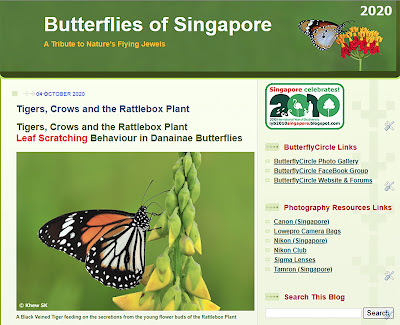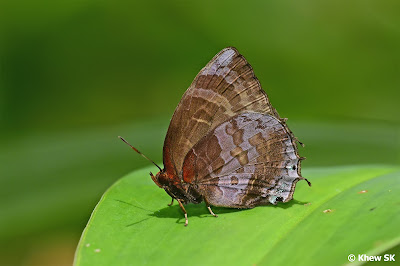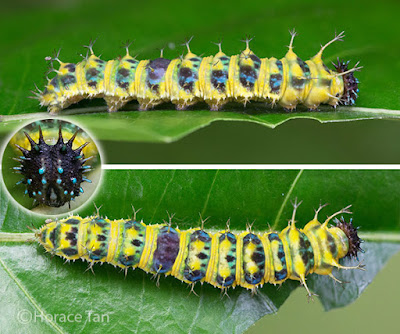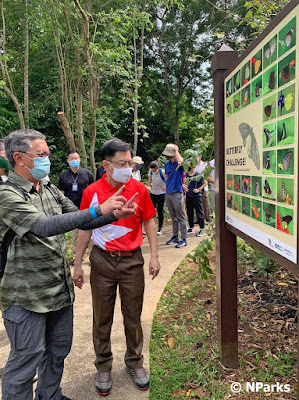1000 Posts - A Milestone
Thirteen Years of Blogging

A male Cornelian (Deudorix epijarbas cinnabarus) sunbathes on a blade of grass
Over 13 years ago, I benefitted much from the knowledge shared by fellow nature enthusiasts in Singapore. Back then, when social media, influencers and blogging were less pervasive than it is today, I enjoyed the stories and information shared by a few active nature bloggers and friends in the Singapore nature community. Amongst these bloggers were Ria Tan, Dr Wee Yeow Chin, November Tan and Marcus Ng. I often followed their blog articles which were always inspiring and promoted nature appreciation across a myriad of topics from the terrestrial to the marine world.

Wild Shores of Singapore Blog by Ria Tan - one of Singapore's most prolific Nature Bloggers
Ria, who started her Wild Singapore Blog and portals to feature the marine, intertidal and to a lesser extent, terrestrial news by various local enthusiasts, became a hub for nature news in Singapore. Her own personal blog, Wild Shores of Singapore, continues to this day. The main portal, Wild Happenings In Singapore, which functions like a calendar of local nature happenings, has now been shut down.

Another friend, November Tan, also persuaded me to share information about butterflies when I was invited to her now-retired series of workshops to educate like-minded and interested parties about various aspects of nature in Singapore. She used to blog via her Leaf Monkey Workshop portal, through which she energetically promoted nature through fun and humorous workshops.

The now-retired Bird Ecology Study Group by Dr Wee Yeow Chin - nearly 25 million visits to the blog and a popular resource in the international birding scene
Dr Wee, who is a prominent author and botanist by training, took up the mantle of bird watching and started his own observations on his blog, which evolved in his Bird Ecology Study Group. Dr Wee's blog was a huge influencer in bringing the bird watching community from just recording sightings of birds, locations and numbers to observing their behaviour in the field in specific habitats and place more emphasis on the ecological study of birds in the region. Unfortunately, due to health and other commitments, Dr Wee ended his internationally popular blog at the end of 2019.

A newly-recorded species in 2020 - The Swamp Tiger was spotted on Butterfly Hill at Pulau Ubin
Then there was "Budak" Marcus Ng with his Annotated Budak blog (last post in 2015), fellow ButterflyCircle member Federick Ho with his "Beauty of Flora and Fauna in Nature" blog (which has intermittent posts and is still active), Debby Ng's Hantu Bloggers (active blog today) and many others.

A male Banded Royal perches on the red flowers of Ixora sp
Prior to joining the blogging community, I had a website created back in 2004 just to post information about butterflies. Back then, another internet veteran, Chin Fah Shin, was an inspiration with his website about Malaysian butterflies which he started way back in 1998! I also observed that there were not many websites dedicated to information about butterflies back then, and I thought that it would be useful to jump on to the blogging bandwagon and see where it takes me.

Butterflies of Singapore Blog 2007-2020 and the 999th article on the blog
I researched on various blogging platforms back then, looking at software like Blogger (now owned by Google), WordPress, and other easy-to-set-up-and-use software. The most popular back then was Blogger, so I tried it and found it much easier than managing a website that I did in the past, where I had to learn a bit of HTML coding and organising the information. So I dabbled around with it and posted my first blogpost on 16 Aug 2007. A comment on that post by Dr Wee still resonated with me. He wisely said "knowledge not shared is knowledge lost."

And that's how it all started. Thirteen years in the making. Although not as prolific in posting almost daily, as Dr Wee did in his heydays on BESG, I organised my thoughts across various topics relating to butterflies - ranging from photography, life histories, habitats, plants, community engagement, education, publications, taxonomy and morphology, locations, travelogues, and many other categories.

Looking around the blogging scene back then in 2007, many others started their own blogs, but few had the stamina to last more than a few months. Most fizzled out after the initial novelty of having a blog to their own name wore off. Others just ran out of steam. At the end of the day, it's still a personal commitment to share information and knowledge. Other than a handful of blogs which attracted business opportunities, there is no commercial gain nor benefit from such a past time.

Members of ButterflyCircle on an overseas outing
I was fortunate that ButterflyCircle was formed three years earlier in 2004, and there were many friends and enthusiasts who were out regularly to record butterflies in the field - both locally and overseas. This provided a good source of information and material for blogposts, and ideas for articles that were spun off a few pictures or observations. This continued through the years, and I am thankful to all these friends and fellow-photographers who helped make this blog more "colourful" and to showcase their good work.


Examples of Horace's masterpieces on Life Histories of Singapore's Butterflies
Then there were those who also contributed articles that added to the diversity of knowledge on this blog. I have to specially mention Horace Tan, who is the life-histories expert behind all the excellently documented articles here. To date, there is a total of 197 life history (and more to come!) documentation of Singapore's butterflies on this blog, and this valuable repository of information far exceeds what anyone else has done for Singapore's butterfly early stages' research. Horace then followed up with his caterpillar host plants series of articles, penning a further 14 articles.

And so this blog has passed its 1000th post milestone. And that's done with at least one blogpost per week, for the past 13 years! With the advent of more convenient platforms on social media like FaceBook groups, Instagram and so on, it is much easier to share information across the world today. Posts are usually more concise, and a large majority of posts tend to be short 1-minute reads. Anything longer is likely to be skipped.

Is a blog still relevant to the way people consume news and knowledge today? Are there other more efficient and productive ways of reaching out? Many questions posed food for thought to me. But like Dr Wee, Ria and the other friends who have stood the test of time and endured for many years with their informative nature articles, perhaps it is time to take a rest and let the younger generation take on the next lap.

Briefing Deputy Prime Minister Heng at Butterfly Hill on Ubin Day 2020
This blog will continue for the remaining months of 2020, in the same way that it has churned out a-week-a-post for the past 13 years. The new year 2021 will see a reduction in the number of articles per month and may be more ad hoc and intermittent in terms of information sharing. I would like to express my deepest appreciation to those who have contributed to this blog in one way or another, and all our readers out there who have enjoyed and appreciated the research and work put into each of these articles since 2007.
Text by Khew SK : Photos by Khew SK, NParks and Horace Tan
Thank you Mr. Khew for this amazing blog! It's the most beautiful, most informative blog I've come across. Your blog has tremendously boosted my knowledge and passion for butterflies. Whenever someone asks me anything butterfly-related, I would refer them to this blog, and they too would be amazed. This is the first time I make a comment, just to let you know how much I love and admire your work!
ReplyDelete-Kim-
Thanks, Kim, for your kind words. I'm glad that the blog has inspired more people like you to learn about butterflies, appreciate and conserve them! :)
ReplyDeleteThank you Mr. Khew & team for the informative and inspirational blog. The articles are of immense help in understanding the flying jewels. The photographs are all ver ymuch pretty and impressive. Keep going....
ReplyDelete